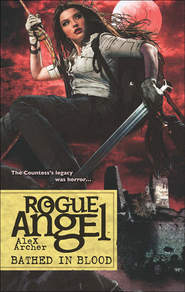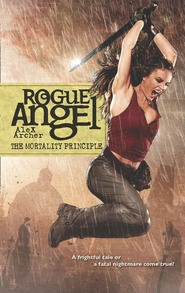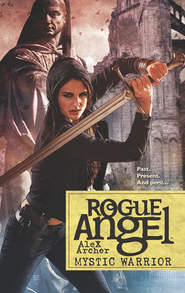По всем вопросам обращайтесь на: info@litportal.ru
(©) 2003-2024.
✖
Serpent's Kiss
Автор
Год написания книги
2019
Настройки чтения
Размер шрифта
Высота строк
Поля
“I was just thinking about how many ships have been through those waters,” Annja admitted.
“Ah, yes.” Lochata’s eyes glittered. “The Romans, the Egyptians, ships from China’s Ming Dynasty.”
“Vasco da Gama was the first European to sail the Indian Ocean,” Annja said. “He was looking for a trade route around the Cape of Good Hope in Africa.”
“The British took over after that,” Lochata said. “They brought their ships loaded with cannons and fought wars to control the area. The Dutch East India Company fought trade wars with the French and others.”
“It isn’t just history out there,” Annja said wistfully. “Sinbad sailed those seas, as well.”
Lochata laughed. “My, my. Bringing up fictional characters. You are the romantic, aren’t you?”
“I try not to be,” Annja said. “But if you think past this moment, if you see into the past, it’s hard not to be.” She paused as she watched the storm-tossed waves. “A lot of those ships didn’t make it across the ocean. Storms took them, they were lost in sea battles and sometimes ships just went down.”
“Or perhaps sea monsters got them,” Lochata said laughing.
“I don’t believe in sea monsters.” Over the past few years, Annja had learned to believe in a lot of things, but she hadn’t yet crossed paths with a sea monster.
“Perhaps not,” Lochata said. “But the sea is a cruel mistress. She takes what she wants. She breaks the weak and the foolish. And she gives back only what she wants to.”
Surprised, Annja looked at the older woman. “I didn’t know you were a poet.”
Lochata smiled and shook her head. “Not me. My husband. He’s been in the merchant marine since he was a boy.” Concern touched her dark features. “I worry about him a lot these days, but he won’t give up the sea. A few years ago, things were not so dangerous out on the water. There are too many pirates out here now. They take what they want, and they kill and destroy.”
Annja didn’t say anything. She knew the professor was right. Before leaving her home in Brooklyn, she’d researched the area’s past and present. The Indian Ocean pirates plying their trade were every bit as dangerous as the Shakti followers who had sacrificed so many innocents to their cruel goddess.
“We need to get everyone together,” Lochata said as she gazed at the storm clouds above them. “I think this is going to be a bad one.”
The wind picked up and rattled through the nearby trees.
“I thought monsoon season was over,” Annja said.
Worry tightened the lines of the older woman’s face. “It should be. I think this is something else.” She looked at Annja and smiled. “You don’t believe in curses, do you?”
Considering everything she’d been through since she’d found the final piece of Joan of Arc’s legendary sword, Annja wasn’t sure how to answer the question. Receiving the sword had changed her perspective on a lot of things.
“Not really,” Annja finally said.
“Neither do I,” Lochata agreed. “But we’ve been disturbing the final resting places of the dead. That’s taboo in almost every culture.”
2
“You’re in India?”
Annja held the satellite phone to her ear and strained to hear. “Yes, Doug. India.”
Doug Morrell, her producer, was twenty-two and excitable. He asked questions, but he only heard what he wanted to hear.
“India, as in half-a-world-away India?” Doug asked.
“Yes.” Annja stood in the main tent and gazed out at the jungle. She and Professor Rai had gathered the dig team together.
Normally a break in the dull routine of digging would have been welcome. However, now they were all trapped in the leaking tent and hoping it would stay erect against the gale-force winds.
A torrential downpour slammed the surrounding jungle and reduced visibility to little more than a few yards. Beyond that everything turned gray and disappeared in the dark night. Annja could barely hear Doug over the crackle caused by lightning strikes and the heavy rain pounding against the canvas.
“What are you doing there?” Doug asked.
“I signed on to do a dig with Professor Lochata Rai.”
“Uh-huh. So what’s he digging up?”
“She.”
“Okay. What’s she digging up?”
“Professor Rai got permission from the Archaeological Survey of India to look for a Shakti sacrifice site.”
“Did you just say sacrifice? ” Doug’s voice rose.
“I did.” Annja regretted telling him that detail at once. If she hadn’t been distracted by the building storm she wouldn’t have.
“ Human sacrifices?” Doug asked.
“And animal.” Annja heard a keyboard clatter to life.
“Are you digging up human or animal bones?”
“Today we uncovered a pit containing several human skeletons.”
“Bodacious.” Doug’s excitement grew. “Always interested in pieces on human sacrifice. Who did you say was doing the sacrifices?”
“Followers of Shakti.” Annja spelled it out for him. She glanced back into the tent and saw the dig crew seated around long folding tables on a collection of lawn chairs.
Everyone on the crew was young. Most workers on archaeological excavations were interns or students. Generally there was barely enough money to fund a team with provisions, much less to make a profit. They sat playing board games, reading or telling stories. None of them acted like the storm worried them, but Annja knew they were concerned.
She was concerned.
“Shakti,” Doug said. “Consort of Shiva.”
“That’s her.” Annja sipped green tea from a bottle. It was one of her few extravagances for the dig. “That’s not something you would know. You’re looking on the Internet, aren’t you?”
“You gotta love Wikipedia,” Doug said.
Annja had written or corrected more than a few entries on subjects on the site.
“Wasn’t Shiva the god of death or something?” Doug asked.
Annja really didn’t want to get into a lesson on Hinduism. That would be a long discussion and Doug would only hear what he wanted.











